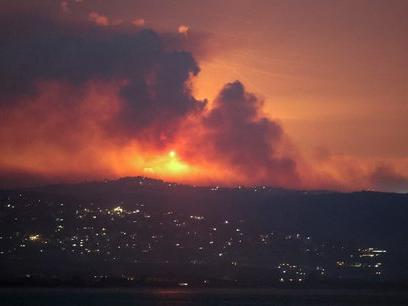On August 25, 2024, the long-simmering tensions between Israel and Hezbollah erupted into a major confrontation, with both sides engaging in large-scale military operations. Hezbollah initiated a massive assault on Israel, firing over 320 rockets and deploying numerous drones, targeting at least 11 Israeli military bases, including those in the annexed Golan Heights. This attack was reportedly in retaliation for the recent killing of Hezbollah’s top commander, Fuad Shukr, in south Beirut.The Israeli military responded swiftly, launching extensive pre-emptive strikes on Hezbollah positions in southern Lebanon. Israeli Defense Forces (IDF) spokesperson Rear Admiral Daniel Hagari stated that Israel had detected preparations by Hezbollah for a ‘large-scale attack’ and acted in self-defense. The Israeli operation reportedly involved approximately 100 fighter jets and targeted thousands of Hezbollah rocket launchers.In response to the escalating situation, Israeli Prime Minister Benjamin Netanyahu declared a 48-hour state of emergency. The conflict has already resulted in casualties, with reports of at least one death in Lebanon due to Israeli strikes. In Israel, there were reports of injuries in the northern cities of Nahariya and Akka.The international community, particularly the United States, is closely monitoring the situation. U.S. President Joe Biden has been briefed on the developments, and the U.S. has expressed support for Israel’s right to self-defense while working to prevent a regional escalation. Ongoing negotiations in Cairo aimed at securing a ceasefire in Gaza have taken on added urgency in light of these events.As the situation remains highly volatile, both Israel and Hezbollah have indicated their readiness to continue military operations if necessary. Hezbollah leader Hassan Nasrallah is expected to deliver a speech addressing the situation, while Prime Minister Netanyahu has vowed to ‘do everything’ necessary to restore security in northern Israel.
Key points
- Hezbollah launched a massive attack on Israel, firing over 320 rockets and deploying drones, in retaliation for the killing of commander Fuad Shukr.
- Israel responded with extensive pre-emptive strikes on Hezbollah positions in southern Lebanon, involving around 100 fighter jets.
- Israeli Prime Minister Benjamin Netanyahu declared a 48-hour state of emergency in response to the escalation.
- The international community, particularly the US, is working to prevent further escalation while supporting Israel’s right to self-defense.
Contradictions👾While Hezbollah claims its attack was successful and ‘accomplished’, Israel asserts that its pre-emptive strikes thwarted a ‘large-scale’ attack.
The actual effectiveness of each side’s operations remains unclear.



